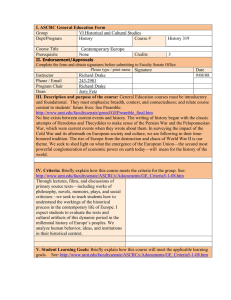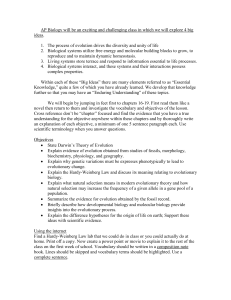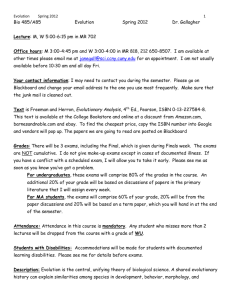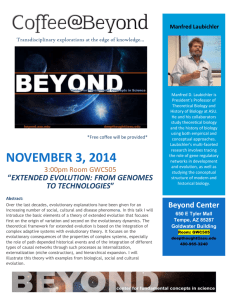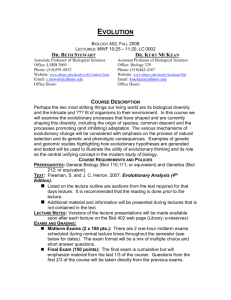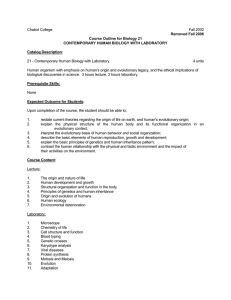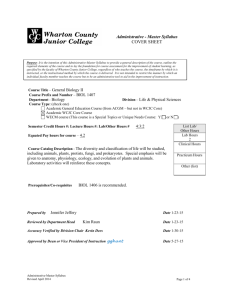I. ASCRC General Education Form Group XI Natural Science Dept/Program
advertisement
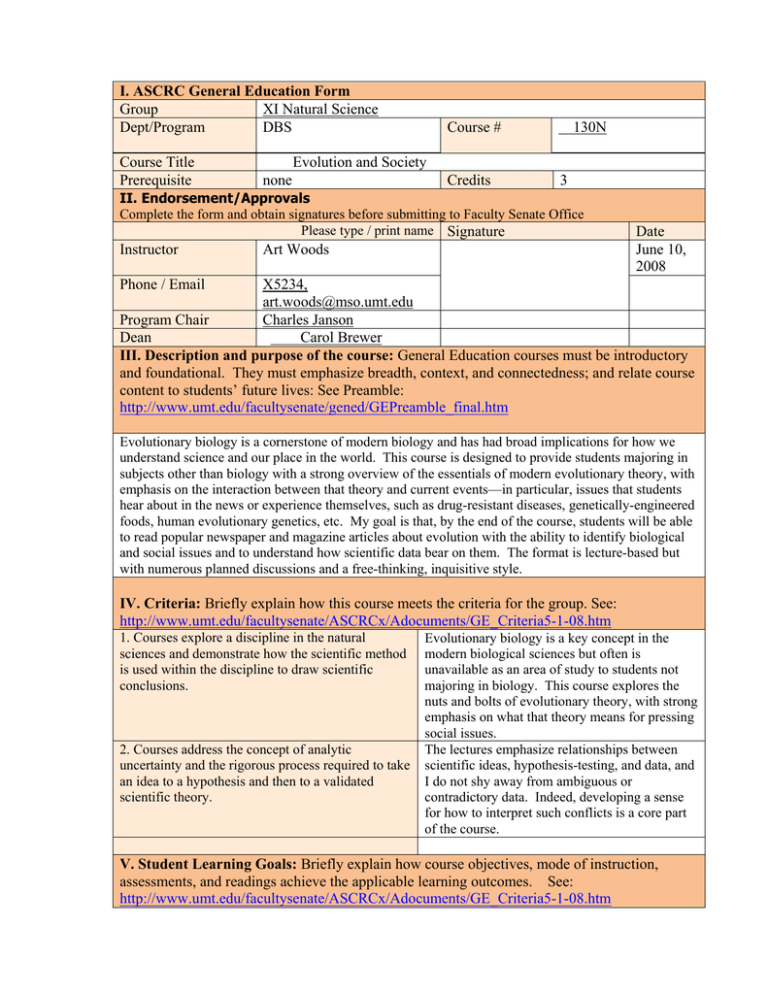
I. ASCRC General Education Form Group XI Natural Science Dept/Program DBS Course # Course Title Prerequisite Credits 130N Evolution and Society none 3 II. Endorsement/Approvals Complete the form and obtain signatures before submitting to Faculty Senate Office Please type / print name Signature Instructor Art Woods Date June 10, 2008 Phone / Email X5234, art.woods@mso.umt.edu Program Chair Charles Janson Dean Carol Brewer III. Description and purpose of the course: General Education courses must be introductory and foundational. They must emphasize breadth, context, and connectedness; and relate course content to students’ future lives: See Preamble: http://www.umt.edu/facultysenate/gened/GEPreamble_final.htm Evolutionary biology is a cornerstone of modern biology and has had broad implications for how we understand science and our place in the world. This course is designed to provide students majoring in subjects other than biology with a strong overview of the essentials of modern evolutionary theory, with emphasis on the interaction between that theory and current events—in particular, issues that students hear about in the news or experience themselves, such as drug-resistant diseases, genetically-engineered foods, human evolutionary genetics, etc. My goal is that, by the end of the course, students will be able to read popular newspaper and magazine articles about evolution with the ability to identify biological and social issues and to understand how scientific data bear on them. The format is lecture-based but with numerous planned discussions and a free-thinking, inquisitive style. IV. Criteria: Briefly explain how this course meets the criteria for the group. See: http://www.umt.edu/facultysenate/ASCRCx/Adocuments/GE_Criteria5-1-08.htm 1. Courses explore a discipline in the natural sciences and demonstrate how the scientific method is used within the discipline to draw scientific conclusions. 2. Courses address the concept of analytic uncertainty and the rigorous process required to take an idea to a hypothesis and then to a validated scientific theory. Evolutionary biology is a key concept in the modern biological sciences but often is unavailable as an area of study to students not majoring in biology. This course explores the nuts and bolts of evolutionary theory, with strong emphasis on what that theory means for pressing social issues. The lectures emphasize relationships between scientific ideas, hypothesis-testing, and data, and I do not shy away from ambiguous or contradictory data. Indeed, developing a sense for how to interpret such conflicts is a core part of the course. V. Student Learning Goals: Briefly explain how course objectives, mode of instruction, assessments, and readings achieve the applicable learning outcomes. See: http://www.umt.edu/facultysenate/ASCRCx/Adocuments/GE_Criteria5-1-08.htm 1. understand the general principles associated with the discipline(s) studied; 2. understand the methodology and activities scientists use to gather, validate and interpret data related to natural processes; 3. detect patterns, draw conclusions, develop conjectures and hypotheses, and test them by appropriate means and experiments; 4. understand how scientific laws and theories are verified by quantitative measurement, scientific observation, and logical/critical reasoning; and This course is designed to explores the major, organizing principles of evolutionary biology, from concept to data. My lectures are driven by data. That is, I often start with some idea, derive predictions, then present data from real studies, which I use to challenge students to interpret. Many of the activities in class involve having students take a dataset and apply concepts we’ve just discussed, or are about to discuss, to analyzing it. The data-focused class format constitutes a semester-long example of the nuances and conflicts between evolutionary theory and experiment. VI. Assessment: (a) Describe measures used to determine whether students are learning the general education requirement goals of the course. (b) Instructors are encouraged to submit copies of student work for evaluation by the assessment committee. Describe the assignment and learning goal that will be submitted for assessment. Students are assessed in three primary ways. First, I give midterms regularly throughout the semester, which provides both me and the students and with feedback about what they’re learning. Midterms are structured to test knowledge and skills at a variety of levels, from simple knowledge to advanced analysis and interpretation. Second, students are asked to do 5 – 10 analysis modules regularly in class, sometimes by themselves and sometimes in collaboration with their neighbors. These exercises are collected and graded. Third, students are evaluated on their verbal participation in class. Many of the topics we cover beg for extensive discussion, and I encourage full participation by all students. Shy or retiring students are gently encouraged to speak up. VII. Syllabus: Paste syllabus below or attach and send digital copy with form. ⇓ The syllabus should clearly describe how the above criteria are satisfied. For assistance on syllabus preparation see: http://teaching.berkeley.edu/bgd/syllabus.html ***this syllabus is from my first teaching of this course at UM, during Spring 08. Evolution and Society (34730 – BIOL 195 – 01) Meeting place: Clapp Building room 423, 10:10 – 11 AM MWF Instructor: Dr. Art Woods (art.woods@mso.umt.edu) Office: Botany Annex 101. 243-5234. Office hours: W 1 – 2 or by appointment. Feel free to email me and set up an alternative appointment time if the set hours don’t work for you. Course Description: This course focuses on relationships between biology and several vitally important social issues, including the evolution of drug-resistant diseases, the construction and use of genetically-modified organisms, human evolutionary biology, and experimental laboratory evolution. Lectures will focus on the basic evolutionary ideas necessary to understand the science behind these issues and on the social and political controversies surrounding them. By the end of the course, you will be able to read popular newspaper and magazine articles about evolution with the ability to identify biological and social issues and to understand how scientific data bear on them. Required reading: There is no formal textbook for this course. However, I am requiring that you read portions of The Beak of the Finch, Jonathan Weiner (available at UM bookstore after 1/22). In addition, information in lectures will be supplemented by various articles and online sites, provided via hyperlinks (FREE). Although supplements are not required reading, they will help you enormously in understanding key concepts. You will perform better on exams if you carefully read all assigned & suggested material. Honest. Course attendance: You should attend all lectures; it will be extremely difficult to complete the course successfully without attending all lectures and in-class discussions. All exams must be taken at their scheduled times. There are no exceptions to this except in the case of emergencies or extreme need that is cleared by the instructor well ahead of time. Disabilities. Students requesting disability accommodations must follow the DSS handbook http://www.umt.edu/dss/current/expect_access/default.htm Exams & Discussion: There will be three in-class exams during the semester (100 points each) and one cumulative final exam (100 points). Tests may contain both multiple-choice and short-answer essay questions. In addition, a number of class periods will be devoted to discussing articles or other online information. A total of 50 points will be available for your performance in these discussions. Good performance means speaking up during discussions with thoughtful ideas, and clear evidence of having read the assigned articles. Cheating. Don’t do it. We won’t stand for it, and the punishment can be severe (handled according to the Student Conduct Code: http://ordway.umt.edu/SA/documents/fromWeb/StudentConductCode1.pdf). Observance of religious holidays. Religious holy days sometimes conflict with class and examination schedules. I will give students that miss course work due to the observance of a religious holy day the opportunity to complete work missed within a reasonable time after the absence, provided I am notified at least 7 days prior to the classes that will be missed. Website: Class announcements, readings, and lecture slides will be available on the class Blackboard site. Grading: This course will be will be conducted with strict adherence to University of Montana policy on grading. You cannot change from a “grade” to “audit” basis past the 15th day of instruction. Past the 30th day of instruction, students must petition in order to formally drop the course or change their grading option. This petition must be signed by the instructor. I will not sign petitions unless there is an overwhelmingly compelling reason to do so, and this reason is in accordance with University policy. What this means is that if you sign up for the course for graded credit, you should plan on getting a grade regardless of your performance. Your final grade will be based on points received from exams, discussion section assignments, and participation in discussion section. Missed exams will be counted as a “0” except under exceptional circumstances, such as death in the family. No make-up exams or papers will be allowed except under exceptional circumstances. The point breakdown is as follows: Points Percent of total First Exam 100 points 22.2% Second Exam 100 points 22.2% Third Exam 100 points 22.2% Final Exam 100 points 22.2% 50 points 11.1% Discussion participation TOTAL POINTS 450 points Schedule of lecture topics. Week 1. 1/23 Overview of HIV and AIDS pandemic. Reading: Pandemic. 1/25 Evolution of HIV reverse transcriptase in response to AZT, Reading: Richman 1998 Scientific American PDF Week 2. 1/28 Evolutionary origins of HIV. 1/30 In class discussion. Assigned papers: 1. Richman 1998 Scientific American (pdf) 2. The origins of HIV & the first cases of AIDS 2/1 Discovering the structure of DNA (1 reading) Week 3. 2/4 Mendelian genetics. 2 readings 1. basic Mendelian genetics 2. problem set: do all 13 problems! 2/6 From genotype to phenotype 2/8 Genetic engineering. 2 readings 1. genetic engineering 2. genetically modified organisms Week 4. 2/11 More genetic engineering 2/13 In class discussion on genetic engineering 2/15 First midterm Week 5. 2/18 No class. Washington-Lincoln Day 2/20 Darwin and Evolution 2/22 Evolution by natural selection—Darwin’s finches Week 6. 2/25 Natural and sexual selection. 2/27 Gene pools, alleles, and evolution of populations 2/29 In class discussion on Beak of the Finch. Week 7. 3/3 Speciation—how does it happen? 3/5 Speciation continued 3/7 Formation of the Earth and appearance of first life. Reading. Article by Orgel 1994, PDF. Week 8. 3/10 Origin of prokaryotic and eukaryotic cells. 3/12 The Cambrian Explosion. 3/14 Extinctions, big and small. 4 short, related readings First article, second article, third article, fourth article. Week 9. 3/17 In class discussion of Orgel article & 4 online extinction articles 3/19 Second midterm 3/21 Diversity of life on Earth. Week of March 24: Spring break, no classes. Week 10. 3/31 Rise of mammals and phylogenetic relationships among primates 4/2 Rise of modern humans 4/4 Rise of modern humans continued Week 11. 4/7 Current variation among human populations. 1 article (PDF). 4/9 Evolution of languages 4/11 Evolution, creationism, and intelligent design Week 12. 4/14 In class discussion. 3 readings: 1. Article by Dawkins. 2. Article by Pearcey. 3. Interview with Francis Collins. 4/16 In class discussion. Article by Steven Pinker. 4/18 Third midterm reading Jablonski & Chaplin Week 13. 4/21 Conserving biodiversity—why and how 4/23 Carbon dioxide and photosynthesis. 1 reading. 1. Photosynthesis overview. 4/25 Global warming science Week 14. 4/28 Global warming science continued 4/30 Global warming policy (reading TBA) 5/2 In class discussion: Global warming (readings TBA) Final exam: Friday, May 9, 10:10 – 12:10.

